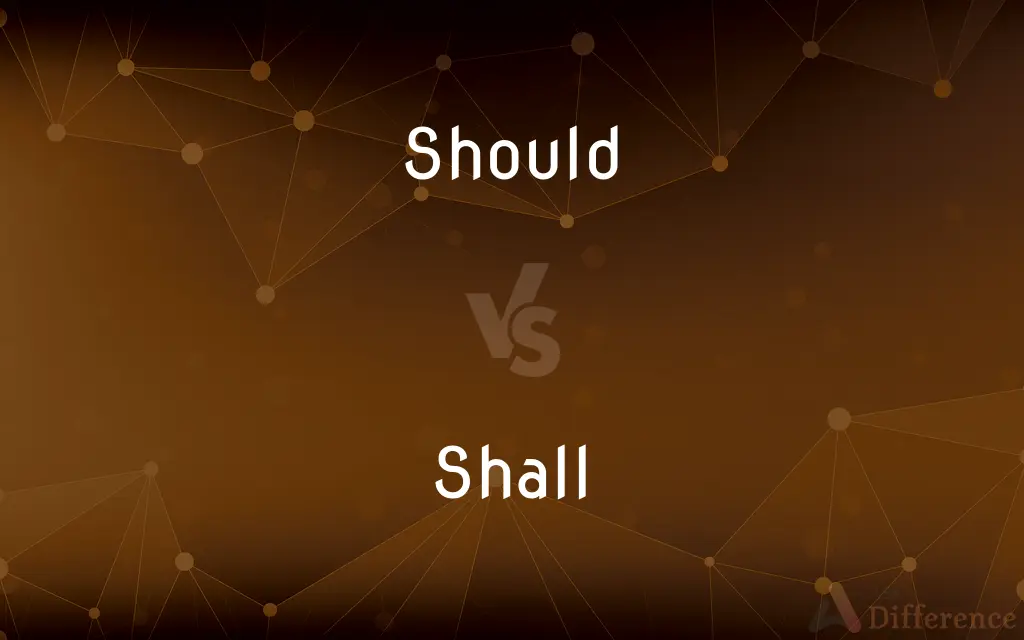Should vs. Shall — What's the Difference?
By Fiza Rafique & Maham Liaqat — Updated on April 16, 2024
"Should" suggests a recommendation or obligation, implying advisability, while "shall" is often used to express a strong assertion or intention, particularly in legal or formal contexts.

Difference Between Should and Shall
Table of Contents
ADVERTISEMENT
Key Differences
"Should" is commonly used to indicate what is appropriate or advisable, often reflecting the speaker's opinion on the best course of action. For instance, it might be used to give advice or express an expectation. On the other hand, "shall" is frequently utilized to convey requirements or decrees, especially in formal documents such as laws, contracts, or standards. It denotes a more obligatory sense than "should".
In everyday speech, "should" serves as a softer, more flexible suggestion, suitable for informal advice or expressing conditional outcomes, like in hypothetical situations. Whereas "shall" is characteristically formal and is used to create obligations or express determination, such as in rules or formally stated plans.
The usage of "should" in a sentence can often imply a moral duty or an expectation of correctness, suggesting that the action is beneficial but not mandatory. In contrast, "shall" generally implies a mandatory action, particularly in legal or procedural contexts where it specifies what must be done, leaving little to no room for discretion.
"Should" can also indicate likelihood or expectation, such as in predictions about the future or speculative scenarios, enhancing its versatility in usage. Meanwhile, "shall" tends to be direct and specific, commonly used in legal, regulatory, and formal settings to assert what will take place or what must be done.
While "should" conveys recommendations that might accommodate personal judgment or preference, "shall" typically communicates an authoritative requirement, underscoring the contrast in their levels of formality and force.
ADVERTISEMENT
Comparison Chart
Function
Suggestion, advisability
Obligation, future action
Common Usage
Advice, expectations, moral duty
Formal decrees, laws, contracts
Formality
Less formal, more flexible
More formal, strict
Implication
Advisable or recommended action
Compulsory action, stronger commitment
Examples in Sentences
"You should see a doctor if you feel worse."
"Passengers shall remain seated during takeoff."
Compare with Definitions
Should
Used to indicate what is probable.
You should find that the book is under the table.
Shall
Used to express determination.
We shall overcome all difficulties.
Should
Used to give advice or suggestions.
You should try the new restaurant downtown.
Shall
Used to express laws, regulations, or directives.
Students shall not leave the campus during lunch break.
Should
Used to ask for someone’s opinion.
What should we do this weekend?
Shall
Used to indicate future action.
We shall meet again next week.
Should
Used to express the conditional mood.
Should you decide to accept this mission, be careful.
Shall
Used to offer or suggest.
Shall I open the window?
Should
Used to indicate obligation, duty, or correctness, often when criticizing.
You should wear a helmet when riding a motorcycle.
Shall
Used in formal settings to create obligations.
The tenant shall pay the rent on the first day of each month.
Should
(auxiliary) Ought to; indicating opinion, advice, or instruction, about what is required or desirable.
Shall
Used before a verb to indicate the simple future tense in the first person singular or plural.
I shall sing in the choir tomorrow.
I hope that we shall win the game.
Should
Used to issue an instruction (traditionally seen as carrying less force of authority than alternatives such as 'shall' or 'must').
You should never drink and drive.
The law is clear that you should always wear a seat belt.
The manual says that this switch should be in the 'off' position.
Shall
Used similarly to indicate determination or obligation in the second and third persons singular or plural.
(determination): You shall go to the ball!
(obligation): Citizens shall provide proof of identity.
Should
Used to give advice or opinion that an action is, or would have been, beneficial or desirable.
You should go and see that film. I think you'll enjoy it.
I should exercise more often, but I’m too lazy.
She should not have been so rude.
Shall
Used in questions with the first person singular or plural to suggest a possible future action.
Shall I help you with that?
Shall we go out later?
Let us examine that, shall we?
Should
(informal) With verbs such as 'see' or 'hear', usually in the second person, used to point out something remarkable in either a good or bad way.
You should see his new apartment. It's like a palace!
If you think her piano playing is bad, you should hear her sing!
Shall
(obsolete) To owe.
Should
In questions, asks what is correct, proper, desirable, etc.
What do you think? What should I do?
Shall
To owe; to be under obligation for.
Should
(auxiliary) Ought to; expressing expectation.
Shall
To be obliged; must.
Should
Indicates that something is expected to have happened or to be the case now.
They should have finished by now; I'll call them to check.
My fruit trees should be in flower, but the cold spring has set them back.
Should
Will be likely to (become or do something); indicates a degree of possibility or probability that the stated thing will happen or be true in the future.
They should have it finished by Friday.
When you press this button, the pilot flame should ignite.
You should be warm enough with that coat.
Should
Used to form a variant of the present subjunctive, expressing a state or action that is hypothetical, potential, mandated, etc.
If I should be late, go without me.
Should you need extra blankets, you will find them in the closet.
The man demanded that he should be allowed entry.
I'm surprised that he should say that.
Should
(auxiliary) cap=1.
I told him that I should be busy tomorrow.
Should
(auxiliary) An alternative to would with first person subjects.
Should
Used to express a conditional outcome.
If I had not been so tired, I should have laughed heartily.
Should
Used to impart a tentative, conjectural or polite nuance.
I should imagine that they have arrived by now.
I should think you would apologize.
Should
Used to express what the speaker would do in another person's situation, as a means of giving a suggestion or recommendation.
It's disgraceful the way that they've treated you. I should write and complain.
Should
To make a statement of what ought to be true, as opposed to reality. en
Should
Something that ought to be the case as opposed to already being the case.
Should
Used as an auxiliary verb, to express a conditional or contingent act or state, or as a supposition of an actual fact; also, to express moral obligation (see Shall); e. g.: they should have come last week; if I should go; I should think you could go.
Common Curiosities
How does "should" function in questions?
In questions, "should" seeks advice or an opinion, as in asking what is advisable or appropriate.
What is the legal importance of "shall"?
In legal contexts, "shall" is used to express obligations or requirements, indicating actions that are mandatory.
Is "shall" flexible in its usage?
"Shall" is less flexible, often used where a strong, clear directive or commitment is necessary.
How do "should" and "shall" differ in conditional statements?
"Should" is used for conditional recommendations, while "shall" is used in more formal or decisive conditions.
Can "should" be used to express certainty?
Yes, "should" can express expectation or likelihood, as in predicting future events based on current information.
What does "should" imply in advice?
"Should" in advice implies a recommendation or suggestion that is considered beneficial but not mandatory.
Can "should" suggest an obligation?
Yes, "should" can suggest a soft obligation, often related to social norms or personal ethics.
Can "shall" indicate an offer?
Yes, "shall" can also be used to politely offer to do something, particularly in questions like "Shall I...?"
Is "shall" commonly used in everyday conversation?
"Shall" is less common in casual conversation and more typical in formal or British English contexts.
When is "shall" used instead of "will"?
"Shall" is used instead of "will" in formal contexts to denote a stronger, often legally binding, commitment to future action.
Share Your Discovery

Previous Comparison
Diazepam vs. Temazepam
Next Comparison
Cemetery vs. GraveyardAuthor Spotlight
Written by
Fiza RafiqueFiza Rafique is a skilled content writer at AskDifference.com, where she meticulously refines and enhances written pieces. Drawing from her vast editorial expertise, Fiza ensures clarity, accuracy, and precision in every article. Passionate about language, she continually seeks to elevate the quality of content for readers worldwide.
Co-written by
Maham Liaqat













































